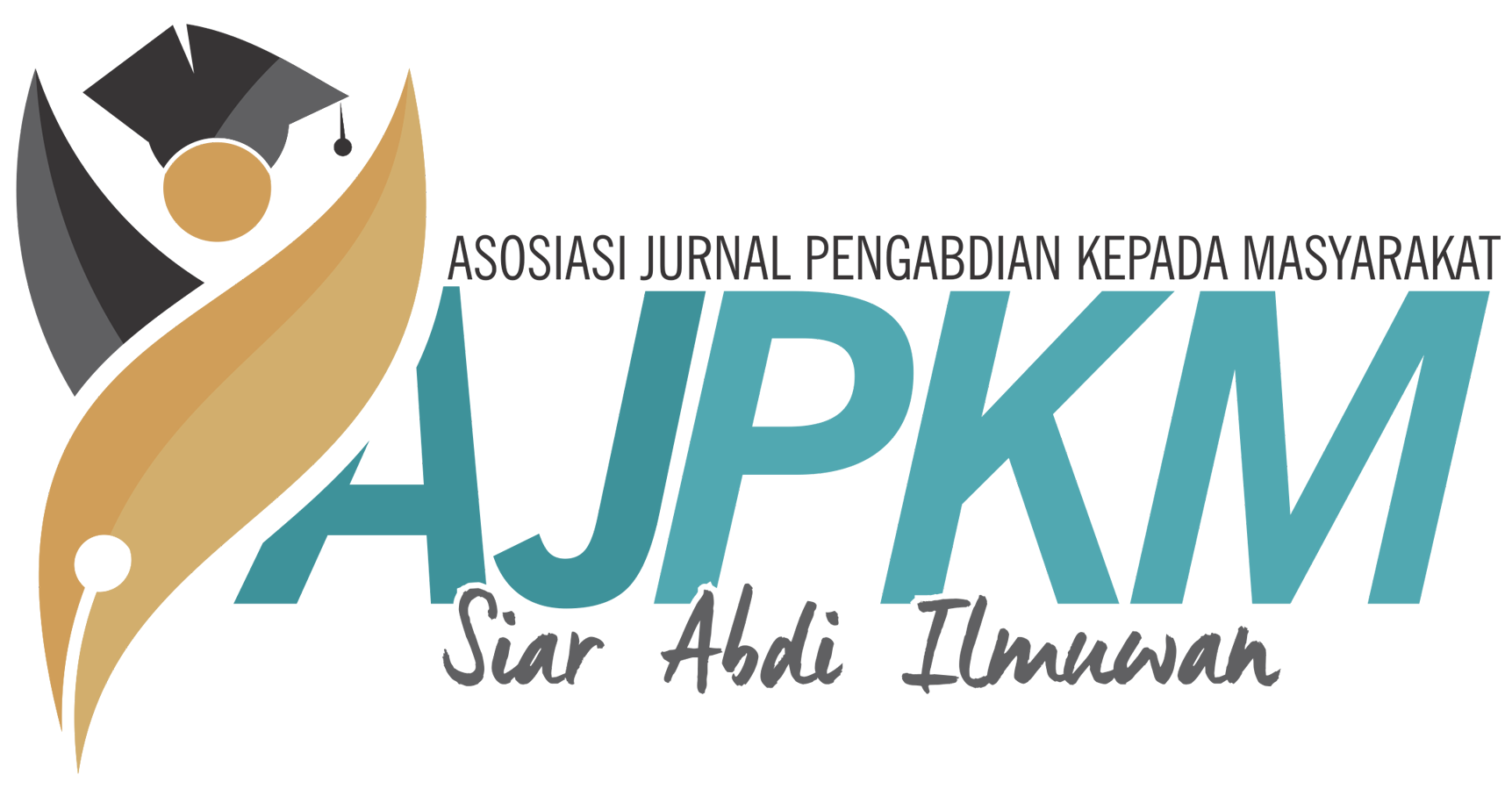COMMUNITY EMPOWERMENT THROUGH V-CAKES TRAINING (VEGETABLE CAKES) TO DEVELOP KNOWLEDGE AND ENTREPRENEURIAL ATTITUDES
PEMBERDAYAAN MASYARAKAT MELALUI PELATIHAN V-CAKES (KUE SAYURAN) UNTUK MENGEMBANGKAN PENGETAHUAN DAN SIKAP WIRAUSAHA
DOI:
https://doi.org/10.23969/pics.v2i2.3474Keywords:
Community Empowerment, V-Cakes, Enterprenuerial attitudesAbstract
The research objective was to empower the community through training in v cakes (vegetable cakes) to increase the knowledge and entrepreneurial attitudes of the community in Palintang Village, Bandung. The method used is quasi-experimental combined with Systemic, Holistic, Interdisciplinary, and Participatory approaches. The research design used posttest only group design (treatment by subject design). The activities carried out began with problem identification, then prioritized problems, and then an action plan was made. This action plan was used as a research intervention in the form of entrepreneurship training. The independent variable is community empowerment through vegetable cakes. The dependent variables are (a) knowledge of entrepreneurship and (b) entrepreneurial attitudes. The data obtained were analyzed descriptively by looking for the percentage change and followed by a paired t-test with a significance level of 5% to analyze the differences in people's knowledge and attitudes between before and after the training. The results of the data analysis showed that the community's knowledge and attitudes were different between the pre and post-V cakes training (p <0.05). In this case, there was an increase in knowledge by 21.18%, and entrepreneurial attitudes increased by 9.57%. Thus it can be concluded that community empowerment through v-cakes training can improve the knowledge and entrepreneurial attitudes of the community in Palintang village, Bandung.
Downloads
References
Acs, Z. J., et al. (2008). “Entrepreneurship, economic development and institutions”. Small Business Economics, Vol. 31. No. 3.
Azadeh, A., Azam, A. 2007. Modeling an Integrated Health, Safety, and Ergonomis Management System: Application to Power Plants. Journal of Res Health Sciences. Vol 7 (2): 1 – 10.
Azadeh, A., Fam, M., Garakani,M.M. 2007. A Total Ergonomis Design Approach to Enhance the Productivity in A Complicated Control System. Journal of Information Technology. 6 (7): 1036 – 1042.
Bakker, A.B. & Leiter, M.P. 2010. Where to Go from Here: Integration and Future Research on Work Engagement; In: Bakker, A.B. & Leiter, M.P. Editor: Work Engagement, A Handbook of Essential Theory and Research. New York: Psychology Press.
Bakker, A.B. 2010. Engagement and Job Crafting: Engaged Employees Create Their Own Great Place to Work, In: Albrecht,S. Editor. Handbook of Employee Engagement Perspectives, Issues, Researches and Practices. USA: Edward Elgar.
Bakker, A.B. Albrecht, S.L. & Leiter,M.P. 2011. Key Question Regarding Work Engagement, European Journal of Work and Organizational Psychology. 20 (1), 4-28 Fam, M.,
Bakker, A.B., Schaufeli, W.B., Leiter, M.P. & Taris, T.W. 2008. Work Engagement: An Emerging Concept in Occupational Health Psychology. Work and Strees Journal, Vol.22. No. 3., 187-200.
Boyless, T. (2012). “21`st century knowledge, skills, and abilities and entrepreneurial competenies: A model for undergraduate entrepreneurship education”. Journal of Entrepreneurship Education, 15, 41-55.
Budiyono, M.A. (2004). Dasar-dasar ilmu Gizi. Malang: Universitas Muhammadiyah Malang.
Dewa, Jawara, Romadlani, Putrui, Arif. (2015). Cuka Mekar (Cup Cake Edamame Kartun) Solusi Kudapan Sehat Dan Bergizi.1(28), 34-54
Dewi, Muharyani, Kusumaningrum. (2017). Pengaruh Modifikasi Sayur Terhadap Porsi Konsumsi Sayur Anak Pra Sekolah. Jurnal Keperawatan Sriwijaya, 4 (2), 19-25.
Drucker, P. F. (1984). Innovation and entrepreneurship. California: Perfect Bound. Kirby, D. A. 2004). “Entrepreneurship education: can business schools meet the challenge?”. Journal of education training, 46, 510-519.
Hamidah Siti. (2015). Sayuran Dan Buah Serta Manfaatnya Bagi Kesehatan. 2(3), 34-58
Liasari, K. 2013. Pengaruh Pengetahuan Kewirausahaan dan Kemandirian Terhadap Minat Berwirausaha: Survey pada Mahasiswa Fakultas Ilmu Pendidikan Universitas Pendidikan Indonesia. Tesis.Universitas Pendidikan Indonesia.
Lynton P., & Pareek, U. (1984). Pelatihan dan pengembangan tenaga kerja. Terjemahan. Jakarta: PT. Pustaka Binaman Pressindo.
Muchtar, 2007. Pemberdayaan Masyarakat Melalui Program Pengembangan Distrik (Kajian Kebijakan dan Implementasinya di Provinsi Papua) Jurnal Penelitian dan Pengembangan Kesejahteraan Sosial. Vol.12.No.02,
Munaf, D.R., Suseno, T., Janu, R.I., Badar, A.M. 2008. Peran teknologi Tepat Guna untuk Masyarakat Daerah Perbatasan. Jurnal Sosioteknologi No. 13
Muntayanjulwa, E. (2011). Nonformal education in development countries: Participation and activities of women groups in Uganda-East Africa.
Nursito, S., Julianto, A., Nugroho, S. 2013. Analisis Pengaruh Interaksi Pengetahuan Kewirausahaan dan Efikasi Diri terhadap Intensi Kewirausahaan. Jurnal Kiat BISNIS Volume 5 No. 2
O’Cass dan Sok. (2014). The Role of Intellectual Resources product innovation capability, reputational resources and marketing capability combinations in firm growth. International Small Business Journal. 32(8). 996-1018.
Pasquinelli, C. (2010). The Limits Of Place Branding For Local Development : The Case of Tuscany and the Arnovalley Brand. Local Economy, 25(7), 558-572
Ray, A. (2008). Waste Management in Developing Asia can Trade and cooperation help? Indian Economics Service, New Delhi The Journal of Environment & Development, 17(1). 3-25
Suryati, Ai. (2015). Pengaruh Mata Kuliah Berbasis Gizi Pada Pemilihan Makanan Jajanan Mahasiswa Program Studi Pendidikan Tata Boga. 2(7), 20-38.
Widani, N. L. (2019). Penyuluhan Pentingnya konsumsi buah dan sayur di Sos Desataruma Jakarta. Jurnal Patria, 1(1), 57-68.
Yuliyaningsih I.P, Susilaningsih, dan Jaryanto. 2013. Hubungan Pengetahuan Kewirausahaan dan Persepsi Peluang Kerja di Bidang Akuntansi dengan Minat Berwirausaha. Jupe-Jurnal Pendidikan Ekonomi Vol 2, No .1.











